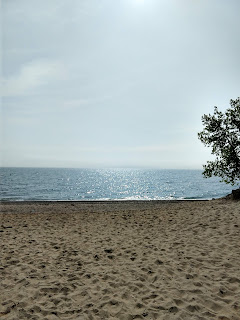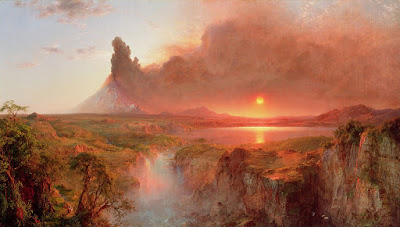I wonder if little Mary felt frustrated at the holiday travel required of her. I imagine her being a much more godly, submissive, patient person than I am, rather than putting up her feet and saying "Go to Bethlehem? On a donkey? Now? Um, no. I'm pregnant. I'm staying right here. Caesar is greedy and power hungry, but even he couldn't expect people like *me* to take part in the census." But she did the right thing and took her baby bump to the right place, and Jesus was born in the eternally destined location. God always knows what He's doing.
All this is just a bit of what I've been thinking about the things we don't like about Christmas being the things that are most nourishing to our faith and our vision of the Savior. I remember one Christmas season a couple years ago when I had the flu and was lying on the couch feeling crushed in pain and I looked over at the Nativity display we had set up, and whispered "Why, why did you come here? This miserable, broken place of pain. You didn't have to come. Oh, how you must love us." And another time as I looked at our Christmas gathering schedule that I was jotting into a notebook, and thought, "All this to do, to be with people, and I am too tired for any of it." That itself is a vivid picture of the first Christmas. Travel, people, bustle, exhaustion, and God getting his work done through ordinary people.
I saw this beautiful old quote from Ambleside Schools on Instagram that said it so well:
"The grass withers, the flower falls away, but the Word of our God endures for ever." As if Peter had said, 'All that has grown out of this root shall drop off in order that it may be seen how deeply the root itself is fixed in the soil.' We do not keep Christmas in the bright, sunny time of the year, but now in the heart of winter, when everything is bare and dry. And our Lord himself is said to be "a root out of a dry ground," from which all the blossoms of hope and joy are to come, but which must first be owned in its own nakedness before they shall appear. If then, men have begun to fancy that their gladness has another root than this, it is meet that for a time they should be left to try whether they can keep it alive by any efforts and skill of theirs. If Christmas joy has been separated from Christ, it is no wonder and no dishonor to Christ that it should grow feeble and hollow. But Christmas is not dead, because the mirth of those who have forgotten its meaning is dead. It is not dead for you, it is not dead for people who lie upon beds tormented with fevers, and dropsies, and cancers. It is not dead for the children in factories, and for the men who are working in mines, and for prisoners who never see the light of the sun. To all these the news, "The Word who was in the beginning with God and was God, in whom is life, and whose life is the light of men, by whom all things were made, and without whom was not anything made that was made, became flesh and dwelt among us, entered into our poverty, and suffering, and death," is just as mighty and cheering news now as it was when St. Peter first declared it to his countrymen at Pentecost. You want this truth, you cannot live or die without it. You have a right to it. By your baptism God hath given you a portion in him who was made flesh; by your suffering he is inviting you to claim that portion, to understand that it is indeed for you Christ lived and died."
from "Christmas Day" sermon, Frederick Maurice, M.A.
Let us embrace an ideal of the perfect Christmas as the one that makes us fall more in love with the incarnate Christ, whether it is in jollification or in quiet pain or grief. He has come for us. By faith He is ours to possess forever. Here is joy unceasing, consolation without end.
 |
Carl Blechen - Landschaft im Winter bei Mondschein (1836) |







